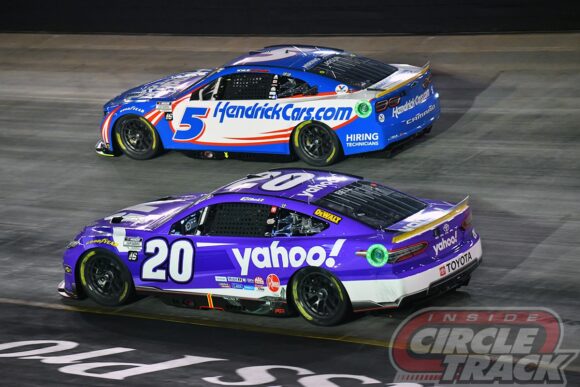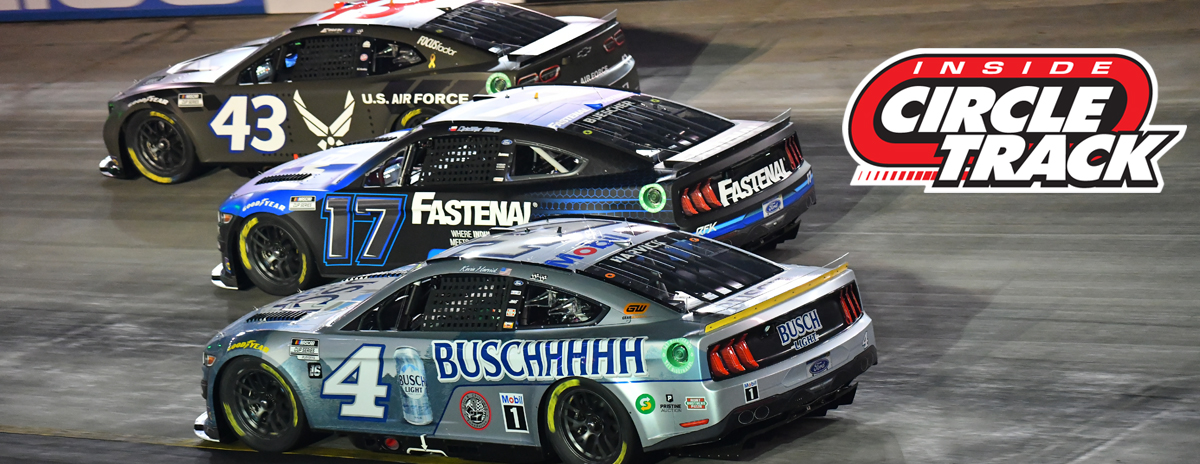
*Turn 2 Blog is a regular feature on InsideCircleTrack.com. Here, site operators Michael Moats and Richard Allen take turns offering their thoughts on the NASCAR and pavement short track racing topics of the day.
Are you surprised that Kyle Larson was eliminated from the NASCAR Playoffs before the ‘Round of 8’?
Richard: My answer to this is both yes and no.
Yes in the sense that the defending NASCAR Cup Series champion driving a Hendrick Motorsports car not making it to the ‘Round of 8’ is surprising no matter who is driving. But that is especially true when the driver is probably the most talented wheelman in all of motorsports. Also, Larson entered the race with what seemed to be a comfortable margin above the cutline but lost all of that when self-inflicted wall contact caused significant damage to his car.
On the other hand, I am not surprised for a couple of reasons. First, this is probably the most unpredictable season I can remember in all the decades I have been watching NASCAR. In that sense, nothing should be surprising. And in this particular round that included the Roval at Charlotte Motor Speedway and the Talladega Super Speedway, no driver or team is immune from disaster.
Secondly, I am not surprised that Larson has been eliminated because the No. 5 team has not been nearly as dominant as it was in 2021. Whether it be because of the unfamiliarity with the Next Gen car or just some sort of post-championship letdown, inconsistency has been more of the theme for this Hendrick Motorsports crew this year than anything else. They just never seemed to be able to hit their stride this season anywhere close to how they did last year.
There has not been a repeat Cup Series champion since Jimmie Johnson’s streak of five consecutive titles ended in 2010 so Larson’s elimination was apparently part of the plan of the racing gods.

Christopher Bell(20) won on the Roval while Kyle Larson(5) was bumped from title contention
Michael: Larson was having a so-so season through the late spring and early summer, then started to pick things up in the late summer even though he had just the one win to show for it. From that standpoint, I’m not surprised. It just seemed like they were too hit-and-miss through most of the season.
One thing that was surprising was some of the mistakes that were made by both crew and driver. They were having some odd mechanical issues, the car cutting out at Darlington is the first that comes to mind. Bending the tow link of the Roval “curbing” was something I didn’t see Larson doing to himself since they seemed to be playing things safe with their strategy. I chalk it up to it just not being their year as opposed to last year when most things went their way.
The revenue sharing discussions we’re hearing from NASCAR’s teams and drivers are similar(on a smaller scale) to those we often hear about in dirt racing, aren’t they?
Richard: Over the past few days we’ve heard rumblings from some of the top drivers and teams regarding the financial tight rope many of them are walking. I’m going to play the role of sceptic for a moment by saying that if it was that close I think we would have seen more organizations fall away, particularly among those who are not winning at the same rate as the top-tier operations.
That said, in my mind, racing does not work out from a financial sense in any direction as I think about it. That is especially true the lower in the ranks you go. And I mean that in terms of tracks, teams, and sanctioning bodies at al levels. My very limited financial knowledge finds it difficult for me to see how everyone doesn’t go broke doing this stuff.
With all of that in mind, it has to be working out financially somewhere or else everyone would stop doing it.
So back to the question at hand. I have absolutely no idea how the revenues from television, series sponsors, ticket sales or anything else are divided among the teams, tracks, and the series. But yes, I do see some similarities in the arguments being made in NASCAR to those of dirt racing and the distribution of revenue from streaming services. After all, fans tune in to watch the cars and drivers race not to watch the sanctioning body sanction. As a result, it is not out of the question for teams and drivers to expect fair compensation.
Different from the dirt racing situation, however, NASCAR’s television partners have to pay to be there. The question is, what happens with that money once they had over those vast amounts of money to NASCAR? Like I said before, fans watch because of the cars and the drivers, and thus, those entities should be compensated for what they do.
Just like in dirt racing, it’s vital for all involved that everyone else is at least doing well enough financially to keep going. If one of the involved entities goes away, the whole thing falls apart.
Michael: I don’t remember the exact numbers, but the tracks get a big part of the money from the TV deals. The teams get a share and NASCAR gets the rest. The teams use their share, along with sponsorship money, to pay everyone on their team, including the drivers.
We have seen drivers having to less money over the last several years because the sponsorship money isn’t what it was. I still believe this was a major factor in a number of drivers retiring in their late 30’s and early 40’s. Now, we’re hearing more from the drivers saying they should get more money with the upcoming TV deal.
A lot of people think the money will go up for the next TV deal. While it usually does, teams have to see what that percentage is versus the increase in costs that all of us deal with on a daily basis. Right now, I think we’re in a feeling out period. We’ll see if this becomes more serious issue once the TV contracts are finalized.
Is the fact that drivers and teams have suddenly become more vocal a good thing?
Richard: When it comes to safety, there can never be enough scrutiny. And the fact that there have been multiple instances this season in which drivers have had to miss races because of injury is disturbing. Those situations need to be closely investigated, and if need be, NASCAR should be called into question when they refuse to address those issues.
In those matters, drivers will typically have fans on their side and their comments will have to be listened to for that reason.
However, when it comes to matters of money, that might not always be true. It is difficult to feel sorry for a guy financially who lives in a mansion, flies to the race track in a private jet, stays in a motorhome worth more than most houses the fans actually live in, then flies back to the airport in a helicopter so he won’t get caught in traffic before getting back on the jet.

Kevin Harvick has voiced concerns over safety
If drivers complain too much about money, that will eventually grow old and fans will disconnect.
Again, though, pointing out the need for greater safety is a worthy topic of discussion while revenue sharing needs to be done only sparingly in a public forum.
Michael: I like to see the drivers be more vocal. It’s their talent that has them where they are. And they’re the ones facing injury in a crash.
I’m not sure if fans will get too tired of the drivers making an issue about money. The drivers have little leverage. Their only recourse is to sit out races, as a group, to make a point. If the teams try to hire replacement drivers, I don’t think fans will go along with that. Imagine paying $100+ for a ticket to see Busch, Larson, Harvick, and Elliott and instead getting drivers from ARCA or other series. I don’t think it will ever come to that but think about the fan revolt.
I’d like to see the drivers be more vocal about the schedule. There are too many races, and they get one weekend in June as an off weekend.
Respond to this post on Twitter by following @RichardAllenIDR and @MichaelRMoats or by liking the InsideCircleTrack.com Facebook page.
Also, dirt racing fans can check out InsideDirtRacing.com for more racing content.
